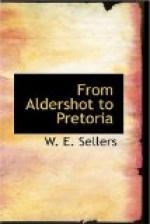’A similar open-air service was fixed for the evening, but never came off. It may have been one of the sad necessities of war time, but was a fact, nevertheless, deeply to be deplored, that at four o’clock on Sunday afternoon our guns, which had been silent for a fortnight, again opened fire and shelled the Boers with lyddite. As I listened to the thunder and the thud of them I could not quite repress a wonder whether that was quite the best possible way of propitiating the God of battle. At eight o’clock, under cover of the darkness, we marched silently out of camp, confident and strong, and bivouacked till midnight just beyond the river. Nearly every other night since we came upon this ground had been brightened by starlight, but on this occasion rain had fallen during the day, and dense darkness covered us at night. So, with my mackintosh wrapped around me, I lay for hours among the troops on the damp ground awaiting the order to resume our midnight march. Soon after one o’clock we were again on the move; but our only light was the tell-tale searchlight from Kimberley, and many a vivid flash of lightning, which only served to make the darkness visible. It was not long, therefore, before the whole brigade hopelessly lost its way, and had to halt by the hour, while the persistent rain drenched almost every man, standing grimly silent, to the skin.
’Precisely at earliest dawn the splendid Highland Brigade appears to have stumbled into a horrible snare, and in such close formation as to render them absolutely helpless against their foes. Instantly their general fell, mortally wounded; for a moment the whole Brigade seemed in a double sense to have lost its head, and, in spite of the fierce and terribly effective fire of our artillery, there followed, not indeed an actual defeat, but none the less a grave disaster, involving further delay in the relief of Kimberley and the loss of over 700 brave men killed and wounded.




